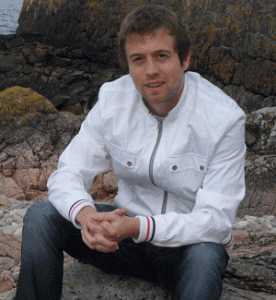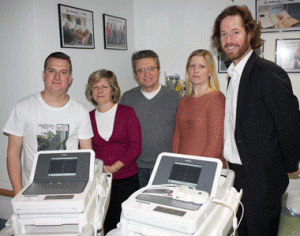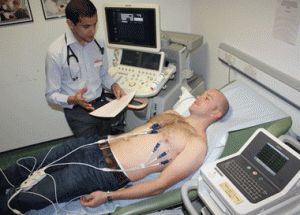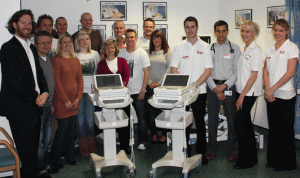
The group, who had travelled from West Sussex for this moving event, had all been involved in fundraising for CRY since the tragic and sudden death of local man, Gary Pope (right), who died in July 2011 aged just 30. A fit and active young man who had led a very healthy lifestyle, Gary had been on holiday in Portugal when he suddenly passed away in his sleep.
Earlier this year (May 2012) ten of Gary’s closest friends – including his girlfriend, Jess and younger brother, Rob – took part in the gruelling London to Brighton Challenge, trekking over 100km from Richmond Park down to the Sussex Coast, helping to raise money specifically for new ECG equipment as an important and lasting legacy to Gary.
Additional fundraising efforts have included two friends taking part in skydives and one running the London Marathon.
Every week in the UK, 12 young people (aged 35 and under) lose their lives to sudden cardiac death – a statistic that’s believed to be a conservative estimate.

and CRY’s Director of Screening, Dr Steve Cox
CRY’s Director of Screening, Dr Steve Cox, says: “Gary’s family and friends have raised over £10,000 to buy these two ECG machines for CRY to use within our screening programme.
“This will not only help us to expand the volume of screening work we can carry out but also a donation like this enables CRY to significantly minimise the costs of the screening programme.”
CRY tests around 10,000 young people every year in the UK – at the specialist centre at St George’s Hospital and at many other screenings at schools and sports clubs across the UK.
A staggering 80% of apparently healthy 14 – 35 year olds who die from young sudden cardiac death will have shown no previous signs of heart defects.
It is widely accepted that testing saves lives, reinforcing the importance of the CRY screening programme and its unique ability to detect conditions in people that might otherwise have gone unnoticed.
Chief Executive and Founder of CRY, Alison Cox MBE, adds: “It takes enormous courage for a family who has been affected by young sudden cardiac death to be able to see beyond their own tragedy and want to raise funds for CRY to help save other lives. I find it very humbling that despite their own terrible grief, they somehow manage to find the strength to support us to try and prevent other families from the same catastrophic grief as they have endured.”

CRY’s Consultant Cardiologist, Professor Sanjay Sharma, is the leading sports cardiologist in the UK and recognised as one of the leading experts in the world on young sudden cardiac death. He makes no charge for supervising the CRY screening programme and, thanks to his support, CRY is able to subsidise the programme so that each appointment only costs around £35.
Often this cost is funded by CRY families who have been affected by a young sudden cardiac death, so there is no charge to the individual who is screened by CRY. Privately these tests could cost in excess of £100, just for the ECG and consultation.
Mrs Lesley Pope, Gary’s mum, adds: “Gary’s death left all of us – family, friends and members of our community – shocked and totally devastated. We had never realised that young and seemingly fit people in the prime of their lives could be affected by these cardiac conditions and we knew that we had to do something to make more people aware and to help improve access to screening.
“As a family, we were incredibly moved by the support and fundraising efforts of Gary’s friends and we are so pleased to be working now with CRY and to have this opportunity to do all we can to stop other young people from dying.”
To find out about forthcoming screening sessions at St George’s Hospital or at local venues across the UK for young people aged between 14 and 35, simply go to www.testmyheart.org to book your free appointment. A doctor with a team of cardiac physicians will be present, with each screening taking no more than 30 minutes. Non-invasive ECG and Echocardiogram equipment will be used for the tests.






